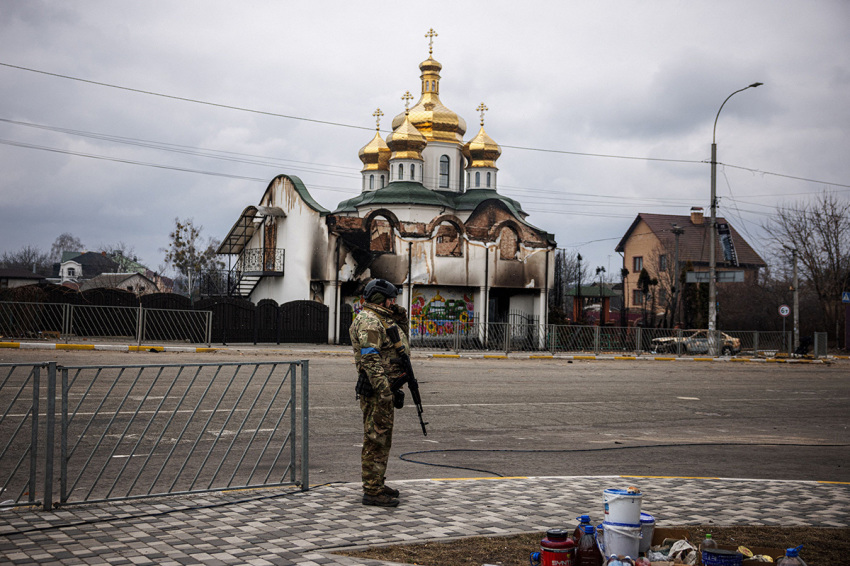Ukrainian Orthodox churches in 'jeopardy' if Russia expands control in Ukraine, USCIRF warns

The top religious freedom watchdog panel in the United States has warned that the Ukrainian Orthodox Church could be in “jeopardy” if Russia expands control over the neighboring Eastern European country that it began invading last month.
The independent and bipartisan U.S. Commission on International Religious Freedom, which is tasked with advising Congress and the federal government on religious freedom matters, said Tuesday that there could be egregious religious freedom violations if Russia is successful in taking over Ukraine.
Russia began its invasion of Ukraine in late February as many are concerned that President Vladimir Putin might have his eyes set on recapturing the global influence held by the former Soviet Union. Since then, hundreds of civilians have been killed while millions have been forced to flee their homes.
“We are horrified by Russia’s attacks on Ukraine, the senseless loss of life, and the lack of respect for human rights. There is a direct relationship between religious freedom violations and the dismantling of civil society in and by Russia,” USCIRF Commissioner James W. Carr said in a statement Wednesday.
“The Russian government uses distortions of religious history to support its claim that Ukrainians have no independent ethno-religious identity or state tradition.”
In the background of Russia’s invasion of Ukraine is an ongoing rift between the Russian Orthodox Church and the Ukrainian Orthodox Church centered on the political tension between Russia and Ukraine.
In 2019, the Ecumenical Patriarch of Constantinople, which holds authority over the world’s 300 million Orthodox believers, recognized the Ukrainian Orthodox Church as independent, meaning it no longer falls under the jurisdiction of Moscow Patriarch Kirill.
Months earlier, the Russian Orthodox Church voted to cut ties with the Patriarchate of Constantinople after a Ukrainian church was granted independence.
After the Ukrainian Orthodox Church was granted autocephaly, several churches under Moscow’s jurisdiction severed their ties with the Russian church, moves that “infuriated Russian nationalist sentiments,” Carr warned.
Additionally, hundreds of churches joined the Ukrainian Orthodox Church.
“These parishes and their leadership are in jeopardy if Russian control expands,” Carr added.
USCIRF Commissioner Khizr Khan said in a statement that areas of Ukrainein which Russia captured in 2014 have seen “the Russian government use baseless charges of religious extremism and terrorism to silence dissent, justify endless raids and mass arrests, and close religious institutions that do not conform to its narrow interpretation of ‘traditional’ religion.”
“Indigenous Crimean Tatar Muslims — who oppose the Russian occupation of their homeland — are routinely charged with terrorism based on their ethno-religious identity rather than any substantive evidence,” Khan stated. “Many of these individuals receive prison sentences of up to 20 years. The Russian government’s aggression toward religious freedom is an indicator that much worse will follow, as we certainly see a risk of this pattern being repeated as Russia expands into Ukraine.”
Over the years, Russia has been criticized for policies that infringe upon religious freedoms.
In 2016, Putin signed into law a bill that criminalized missionary work and evangelism outside of houses of worship.
Christian groups referred to it as the “anti-missionary bill.” Many feared that the law would be used to crack down on evangelists and house churches not affiliated with the Russian Orthodox Church.
Passage of the law motivated evangelist Franklin Graham and the Billy Graham Evangelistic Association to move a planned global summit for the persecuted church out of Moscow. The event was later held in Washington, D.C.
Following the law’s passage, reports surfaced of pastors and missionaries being deported or arrested.
One year after the law was enacted, the Norway-based Forum 18 recorded 181 cases prosecuted under the law, most of which involved Evangelical Protestants.
In Ukraine, Russian shelling has damaged numerous religious buildings, USCIRF notes. One of those buildings is a 16th century Orthodox monastery where over 500 people took shelter. Another was a mosque in Mariupol, where 80 civilians were taking refuge.
While nearly 300 Russian Orthodox clergies have signed a letter voicing their opposition to the war, Patriarch Kirill’s comments have seemingly provided a religious justification for the war.
In late February, Kirill reportedly called Russia’s opposition in Ukraine “evil forces” who have “fought against the unity of Russia and the Russian Church prevail.”
The Orthodox Public Affairs Committee, which advocates on behalf of Orthodox churches worldwide, condemned Kirill’s remarks, saying in a statement that his words enable Putin by “giving religious cover to this unconscionable and unjustified conflict.”
“Kirill’s statements ring hollow and have the stench of direct government interference,” the OPAC statement shared with The Christian Post reads. “Is this because he owes his position and the lucrative benefits he receives to Vladimir Putin? Why does he not speak out for his Ukrainian Flock? Why does he endorse the Russian military, even presenting them with a holy icon?”
“Russia is no longer an empire,” the statement continues. “It is a nation-state that tried to recover from the legacy of the economic misery and humanitarian failures of the Soviet Union. Patriarch Kirill owes his allegiance to Jesus Christ, not to Vladimir Putin, an ever-increasing tsar-pretender.”
Follow Samuel Smith on Twitter: @IamSamSmith, or Facebook: SamuelSmithCP.



























